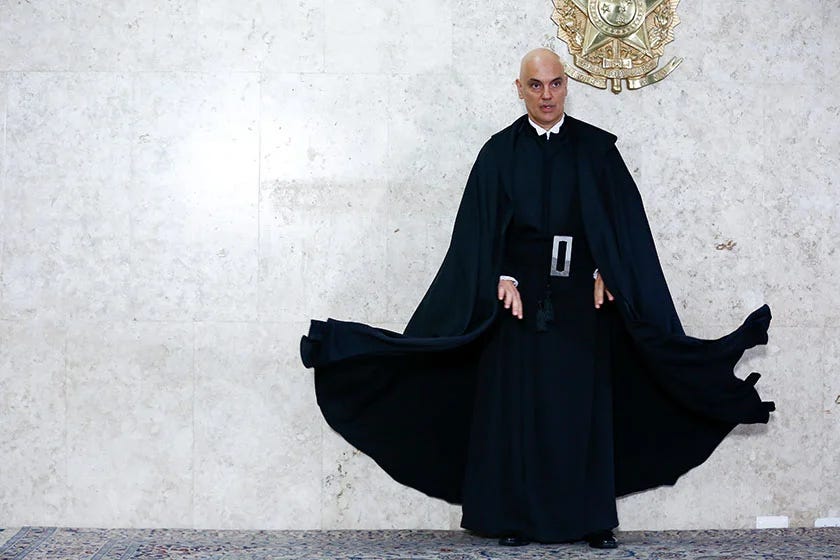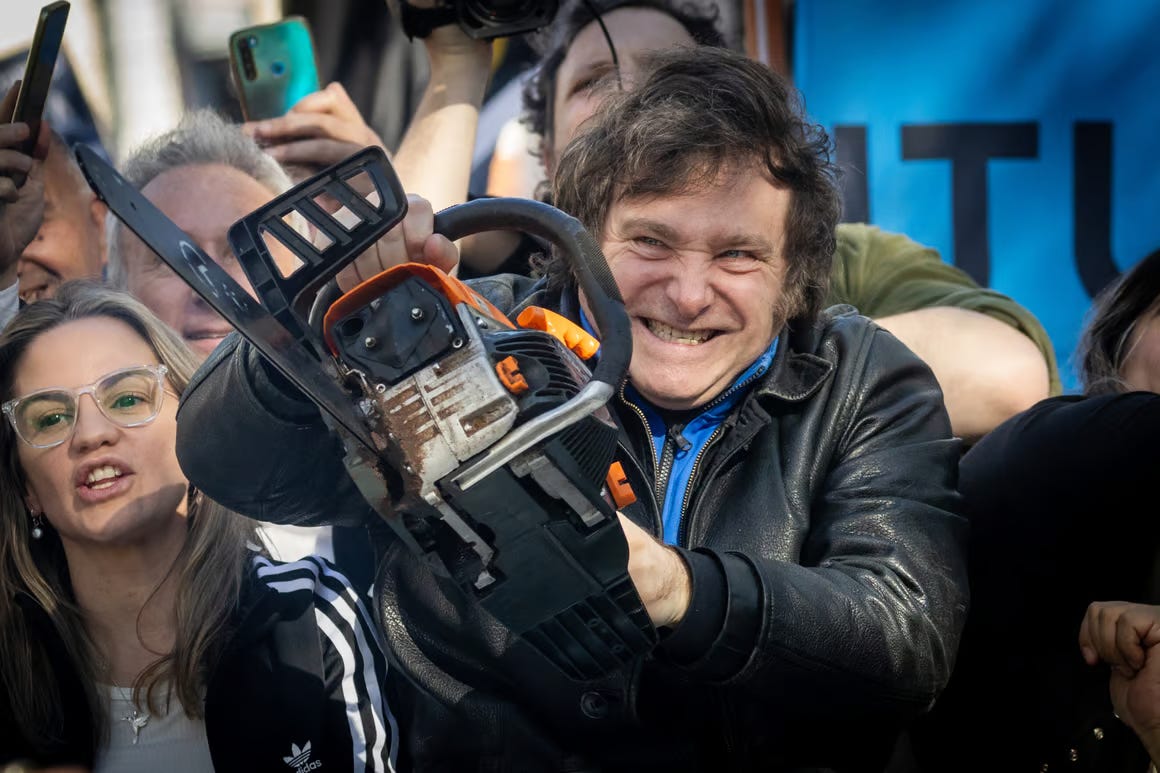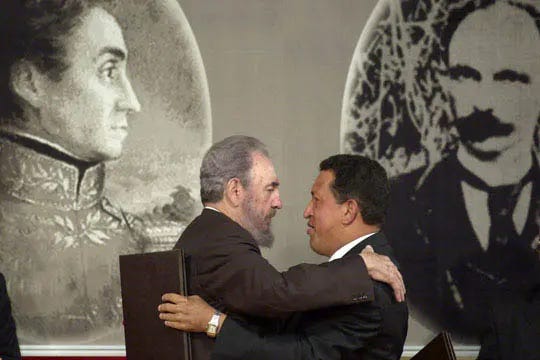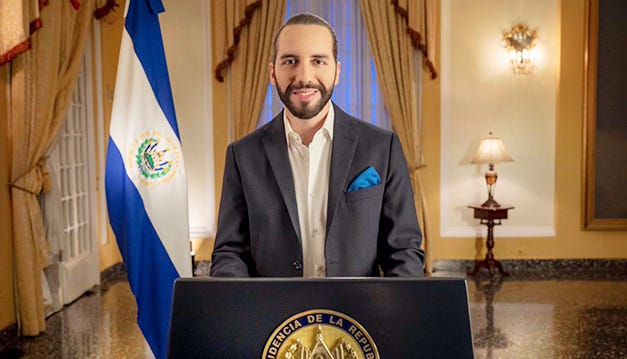Today's Most Consequential Leaders, Good and Bad
All are from this hemisphere, and a competent border czar would learn a thing or two. They are Argentina's Javier Melei and El Salvador's Nayib Bukele. There are two more but for the wrong reasons.
There are four consequential leaders in our hemisphere right now not named Biden, Harris, or Trump. And if we had anyone serving as a competent “border czar” during the past four years, that person would have learned valuable lessons about the tenures, reigns, policies, and elections of all four, especially in El Salvador and Argentina.
They are Javier Milei, President of Argentina; Nayib Bukele, President of El Salvador; Nicolas Madura, President of Venezuela; and Luis da Silva, President of Brazil. The latter two presidents represent censorship, socialism, repression, decline, and corruption. The former two represent hope, freedom, security, and prosperity.
Each demonstrates very different paths to prosperity or tragedy. In several ways, they illuminate America’s choices this election season with 40 days and 40 nights until the votes begin to be counted. Early voting is already underway in much of the nation. Our leading candidates, in many respects, represent these choices. I’ll let you decide which ones, but it’s not rocket science.
Let’s get the bad guys out of the way first.
Venezuela
Venezuela’s story is our hemisphere’s worst tragedy, with the possible exception of Cuba. That the despotic, backward, and impoverished island nation is now Venezuela’s closest partner, if not sponsor, in the hemisphere should tell you a lot. Venezuela once was South America’s most prosperous nation, a successful if not corrupt country subject to boom-bust cycles that were not uncommon in commodity-rich locales.
Then, Hugo Chavez emerged with the support of a military in which he served and a fawning press. First elected in 1998 on a populist platform after several failed coup attempts, he was temporarily disposed of but quickly regained power with support from the Bush Administration. “We do hope that Chavez recognizes that the whole world is watching and that he takes advantage of this opportunity to right his own ship, which has been moving, frankly, in the wrong direction for quite a long time,” said then-National Security Advisor Condeleeza at the time. Her hopes were quickly dashed; Chavez embraced Fidel Castro, called Bush the devil, and nationalized industries on a path to socialism, energy and food shortages in a once-plentiful exporter of both, and one-party totalitarianism.
Venezuela exports more people than oil and has fallen from the richest to one of the poorest nations in the hemisphere. Chavez died of cancer in 2013 and was replaced by his vice president, Nicolas Maduro. He was soundly defeated in elections a few weeks ago but arrested his opponents, accused the US and others of interfering in the election, and reported very different results without credible documentation. Several countries, including the US and Argentina, have refused to recognize his victory. Things have only gotten worse there as Venezuelan gangs are making their presence known in some US cities and towns, thanks to the ability to flee here at the invitation of our open southern border.
Brazil
Brazil is the hemisphere’s second-largest country by population behind the United States, with nearly 200 million people. Lula da Silva, the leftist economist who was imprisoned for corruption after his last presidency, returned to unseat Jair Bolsinaro, a populist conservative, in a close and contentious election. Silva seems to have delegated police powers to his ally on the nation’s Supreme Court, Alexandre de Moraes, who has banned Elon Musk’s X from the nation in a crackdown on against free speech and political opposition, and, unlike our judges, with police powers to enforce it. American journalists Michael Shellenberger and others have documented the sordid tale, including the Alliance Defending Freedom.

Venezuelan-style socialism hasn’t been imposed on Brazil, as the nation is generally well-off economically despite political corruption. Still, it’s now on its way to similar one-party control. Lula has long maintained close friendships with the late Fidel Castro and Iran’s mullahs. He’s also embraced Moraes’ plunge into political censorship.
Argentina
Like Venezuela, Argentina was one of South America’s most prosperous countries for many years. Still, it fell into economic disrepair and political corruption under a series of populist dictatorships interrupted by an occasional military junta. Their decline started under the legendary populist Juan Peron, with an assist from his charismatic wife, Eva, and only worsened with time. Argentina has long suffered from horrific regulatory abuse and massive triple-digit inflation, along with the corruption that usually accompanies it.

In December 2023, Argentinians decided that they had had enough. They elected a chain-saw-wielding libertarian economist, Javier Milei, who has done precisely what he promised. He has dramatically cut and curtailed government and removed price controls and other restraints on the economy. The results are not without pain, but the Wall Street Journal on Sunday outlined an exciting consequence of removing price controls on everything from rental housing to groceries. Inflation has plummeted from 237% to 18% in record time.
The Milei administration has also scrapped price controls on staples such as milk and sugar. The president lifted controls on cooking gas, removed export controls on beef and cut government requirements to import steel, hoping to ease construction costs.
And he ditched the restrictions he said made renting an apartment an odyssey that hurt those it was trying to help. . .
Milei, a libertarian economist, long warned Argentines that his free-market changes would initially make conditions worse before they got better as he slashed public spending to tame inflation. He said it was necessary to unravel tight economic controls he inherited from the previous, left-wing Peronist government, which implemented price controls on some 50,000 products from food to clothing as part of its Fair Prices program.
Milei says his measures are delivering results. He is projecting annual inflation of 18% next year, down from the current 237%, one of the world’s highest rates, as he works to tame the never-ending fiscal deficits at the root of Argentina’s decades long economic turmoil.
Milei was in the United States in April and visited with Elon Musk, who isn’t being censored in Argentina, far from it. Milei spoke to the United Nations on Monday, and a summary of his comments can be found here (a full transcript wasn’t available, so I have to rely on a UN bureaucrat for a summary).
El Salvador
The Central American nations are each a tragedy in their own way, Nicaragua is in the grips of a communist totalitarian, and most of the others, except for Costa Rica, Belize, and now Panama, suffer corruption and criminal gangs that specialize in human and illicit drug trafficking.
There’s a new exception: El Salvador. This small nation has gone from one of the region’s most dangerous to perhaps its safest, and the world is taking note.
Nayib Bukele was reelected to a second term earlier this year - somewhat controversially, since second terms once were not allowed - but there’s no quarrel with his crackdown on gangs and a corrupt legal system. El Salvadorans are not only breathing easier again, tens of thousands of El Salvadorans in the United States are now talking about returning. Jobs and foreign investment are returning, too.
Bukele spoke to the United Nations this week. His speech tells a story that looks awfully like a road map for many American cities and towns gripped by crime and corruption, especially the crime-ridden “sanctuary” cities of Chicago and Philadelphia, among others. I encourage you to read or listen to the entire speech.
In a very short time, El Salvador went from being the homicide capital of the world, from literally being the most dangerous country in the world to being the safest country in Latin America. It is no longer a promise, it is a reality that Salvadorans are living. And any foreigner can go and see for himself. That is why many in the world are watching what is happening in our country, especially in Latin America, but also in the United States and elsewhere. They see what is happening in El Salvador and ask, "Why can't the same thing happen in our countries. . .
The first thing we did was to make sure we were on the side of God and the people, because no worthwhile transformation can be accomplished by obeying external powers. Secondly, we created our own method, a method designed for our own reality, created by those who live that reality.
Then the Salvadoran people gave us two votes of confidence. Well, it has given us several votes of confidence, but these are perhaps the two most important so far. The first was when they elected me as their President. The second was when they decided to give us, through the legislative body, governing power. We knew then that we had an obligation to the people, an obligation to make the decisions necessary to address our most pressing problem: insecurity.
The efforts we were making to improve health and the economy would serve little purpose if our people continued to be killed and judges and prosecutors let murderers go free.
Bukele has his detractors, many of whom call him an authoritarian or even “the world’s coolest dictator.” He’s referred to himself as a “philosopher king.” But he enjoys broad popular support and a substantial majority in El Salvador’s legislature. I’ve heard no credible whiff of corruption or political shenanigans like in Venezuela—just the opposite. But be careful to attribute his success to forces of “the right” or “the left.” He has eschewed foreign influence and found his own way, overcoming the nation’s two leading parties. It’s not a perfect democracy, as we might understand it, but it’s much better than they had before.
Imagine. Sixty thousand El Salvadorans are interested in returning home. You would think our “border czar” would be paying attention to that, along with the economic policies and their consequences for the other three, especially the chain-saw-wielding president of Argentina. She would have the humility to learn things from our neighbors.
A competent border czar would have learned that censorship is oppression. She would have learned that price controls and more government control of the economy lead to higher inflation, shortages, and economic ruin, and that censorship is the pathway to the destruction of freedom. And she would have learned that getting tough on crime—not de-funding the police or bailing out violent demonstrators—is the way to safe streets, peace, prosperity, and fulfilling the American promise.
Instead, we now have a former “border czar” and candidate for President who has opted for the tactics and policies of the bad guys. Vote accordingly.





Why is it I can't imagine Kamala wielding a chain saw or building prisons to lock up every gang member in sight?
good history review